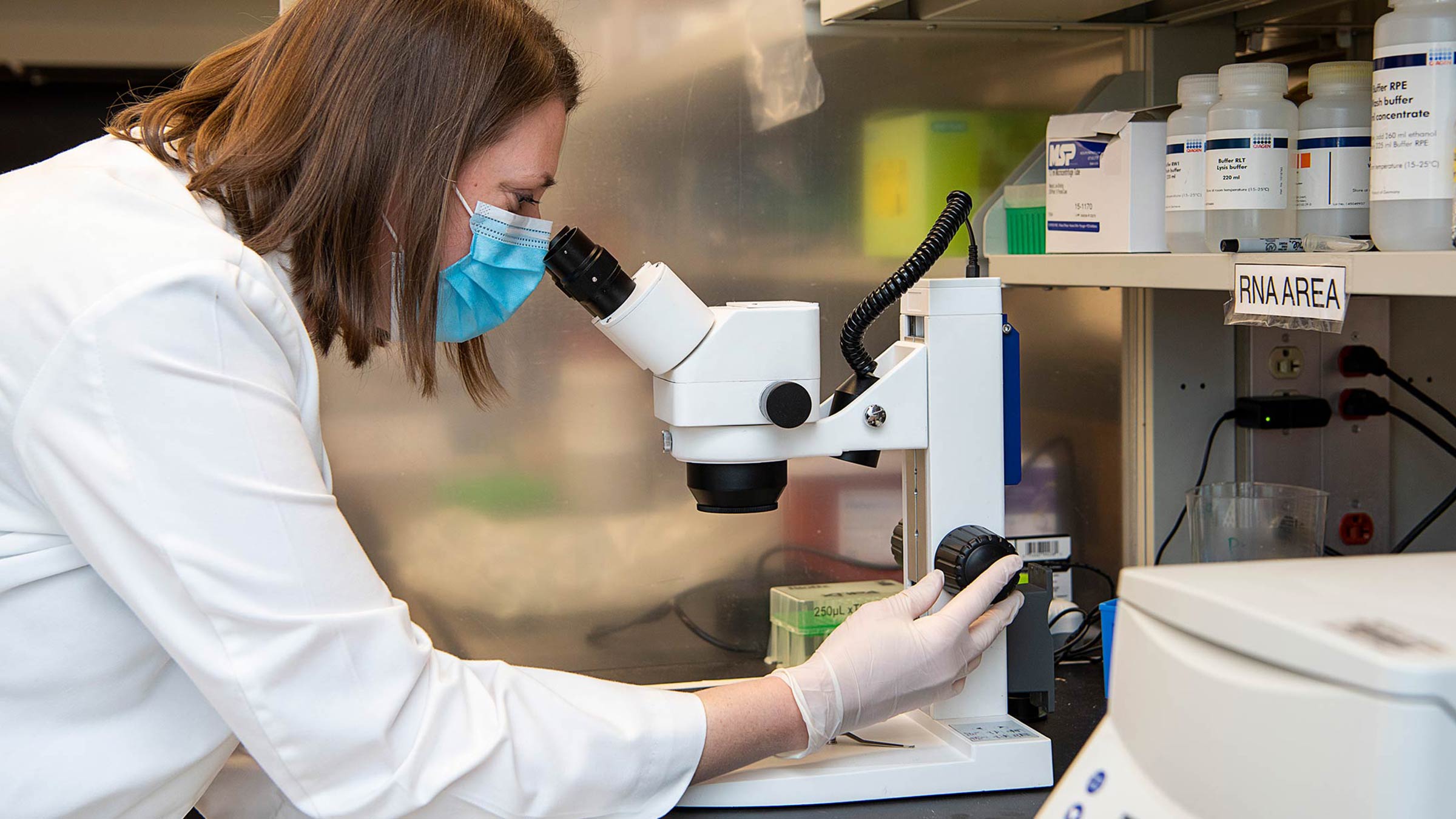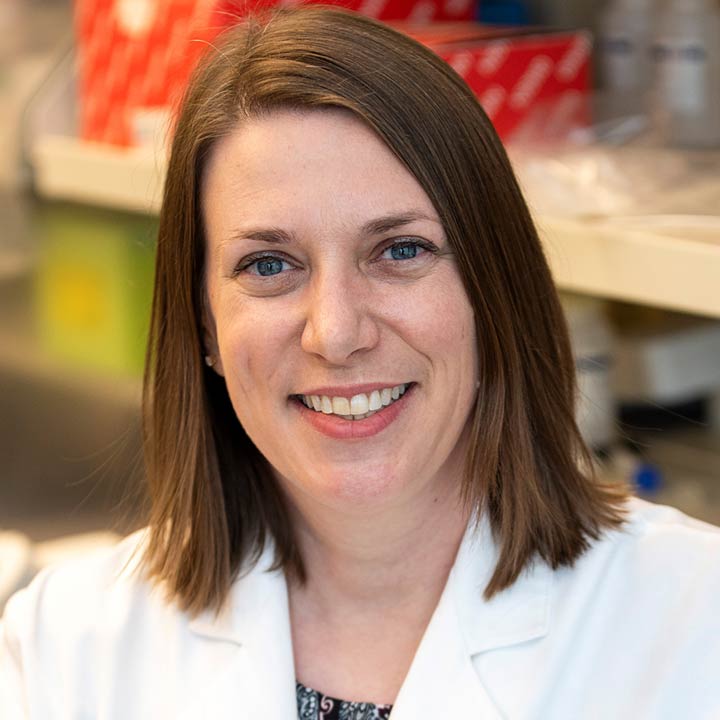New drug shows promise in treating chronic lymphocytic leukemia and non-Hodgkin’s lymphoma
A new study of a targeted drug at The Ohio State University Comprehensive Cancer Center – James Cancer Hospital and Solove Research Institute (OSUCCC – James) may offer a new treatment option for patients with relapsed blood cancer.
What is chronic lymphocytic leukemia (CLL)?
CLL is a cancer of the white blood cells that affects the blood, lymph nodes and bone marrow. It’s the most frequently diagnosed leukemia in adults. Each year, about 20,000 people in the United States are diagnosed with this blood cancer.
What is non-Hodgkin’s lymphoma (NHL)?
NHL is a group of several different types of diseases called lymphomas, which are blood cancers of the immune cells. NHL affects the lymph nodes, blood and other organs. Some types of NHL are more aggressive, while others are slow-growing. According to the National Cancer Institute, about 80,000 new cases will be diagnosed this year.
CLL and NHL mainly affect older adults. The average age of people when they’re diagnosed is around 70 years old.
Types of treatment available for CLL and NHL
Not all treatment for CLL and NHL are the same. There are several standard treatments for CLL and NHL that may include:
- Chemotherapy — These are drugs taken by mouth or injected into a vein or muscle to destroy cancer cells or stop them from dividing.
- Radiation therapy — High-energy X-rays are used to destroy cancer cells or keep them from growing.
- Targeted therapy — These are drugs that attack cancer cells without destroying healthy surrounding cells.
- Immunotherapy — Also called biologic therapy, immunotherapy boosts a patient’s immune system to fight cancer. Substances made by the body or in a lab are used to direct or restore the body’s natural defenses against cancer.
- Transplant — Stem cell transplants enable patients to receive chemotherapy treatment then later replace blood-forming cells that have been destroyed by cancer treatment.
Most treatments are individually designed for each patient. Treatment will depend on:
- The type of cancer (CLL or NHL)
- A patient’s age and general health
- If the CLL or NHL was just diagnosed or if it has come back
- The stage of the cancer
What is different about nemtabrutinib as a treatment for CLL or NHL, and how does it work?
Nemtabrutinib (pronounced nem-ta-BROO-ti-nib) is a type of treatment that inhibits a protein known as Bruton’s tyrosine kinase (BTK) that is essential for the growth and proliferation of cancer cells. Also called a BTK inhibitor, nemtabrutinib is a targeted therapy taken in pill form. The drug works by finding the protein, or BTK, inside the cancer cell and preventing it from binding.
What makes nemtabrutinib different is that it can bind to this protein even when there are common mutations that make other BTK inhibitors stop working. This drug can get around that mutation and still bind to the cell at a different site.
What makes nemtabrutinib study findings look promising?
Nemtabrutinib is promising because it’s effective and safe. In the first clinical trial of this drug in humans, nemtabrutinib has been effective in producing remissions in people with CLL and NHL, and it’s well tolerated by most patients.
When we conduct a clinical trial, we want a drug that’s going to work well and kill cancer cells in patients with these cancers. We also want a drug that’s not going to cause severe side effects. Nemtabrutinib is successful at both.
How do you determine the best treatment for a person with CLL or NHL?
Because all cancers are very different even within the same disease, we look specifically at the best ways to treat each individual person. We study the genetics of the disease as well as different gene mutations or alterations in the chromosomes to help decide which treatment or combination of treatments is going to work best for that individual.
What is the most advanced treatment right now for CLL or NHL?
There are many exciting new therapies for patients with CLL or NHL that we’re using at the OSUCCC – James.
For CLL, we use targeted therapies that include drugs or other substances that target specific proteins important in the CLL cells for survival. These therapies can effectively kill the cancer cells without destroying healthy surrounding cells. We also use immunotherapy that boosts the patient’s own immune system to fight the cancer. This might be with antibodies made in a lab that are like those your immune system makes naturally.
For NHL, sometimes we use chemotherapy drugs. But for many patients, we use targeted therapy and immunotherapies, including chimeric antigen receptor T cells and car-T cells.
Why are clinical trials important to cancer research? How does someone enroll in a trial?
Clinical trials are critical to cancer research — it’s how we bring drugs from the laboratory to patients, and get the drugs approved for use. Clinical trials allow patients access to the newest and most cutting-edge treatments for these diseases.
At the OSUCCC – James, we never conduct a clinical trial that we don’t think is likely to be better than what we offer as a standard of care. We use clinical trials to allow our patients to get access to better drugs, while at the same time generating the knowledge we need to make these drugs a standard of care for the future.
To enroll in a clinical trial, a patient should talk to their oncologist about access to clinical trials for their specific cancer type. If they don’t have access to clinical trials, they may be able to refer you to a place like the OSUCCC – James that’s supported by several large collaborative or network research grants.

Your support fuels our vision to create a cancer-free world
Your support of cancer care and pioneering research at Ohio State can make a difference in the lives of today’s patients while supporting our work to improve treatment and reduce cases tomorrow.
Ways to Give








